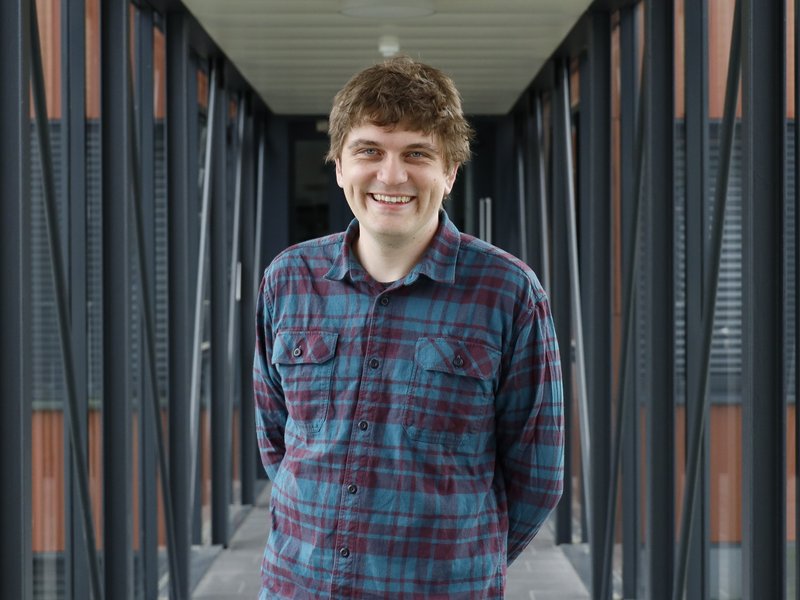Together with Anna Schidek, Lukas Rißmann has been the first doctoral student at Landshut University of Applied Sciences' Graduate Centre since the summer semester of 2024. Since the transfer of the right to award doctorates, the university has established two doctoral centres in cooperation with partner universities: DigiTech and DIWAG. This secures the academic career path from a Bachelor's to a Master's degree programme at Landshut University of Applied Sciences through to the award of a doctorate.
Rißmann is shaping the future with his doctoral thesis
Rißmann enthusiastically explains what appeals to him about the challenge of a doctorate: "I'm motivated by things I don't know yet. I find it exciting to find out what awaits me at the end." He also shows this enthusiasm when he talks about the topic of his doctorate, "Automated Factory Layout Planning using Deep Learning": he wants to implement a factory layout with the help of generative artificial intelligence (AI) - which he has already studied intensively in advance. The sub-area of "machine learning" in particular will support him, especially the method of "reinforcement learning". The difficulty here will be to master the topic on different levels. This is because the factory planner of the future will be supported by AI: it can identify and evaluate many possible solutions. In this way, Rißmann is actively shaping the future and finding solutions for society.
Facing ups and downs during your doctorate with the Graduate Centre
However, Rißmann is also realistic about his dissertation. "It will demand a lot from me," the doctoral student knows in advance. Because "on average, it takes four to five years to obtain a doctorate," confirms Linda Klingler, advisor at the Graduate Centre at Landshut University of Applied Sciences. Perseverance is required here. A doctorate is full of ups and downs. Klingler recently defended her doctoral thesis herself and reports as follows: "Initially, as a doctoral student, you're busy familiarising yourself with the topic and experimenting a lot. There is little output to report on. But as soon as an analysis or a paper is finished, you actively take part in conferences and involve the public and exchange ideas. That gives you a good feeling, motivates you and helps you overcome difficult phases." She is planning open consultation hours for doctoral students in the future, wants to "take away the fear of failure" and show ways forward.
Networking decisive for doctorate and academic career path
"It's super important to stay in touch. You have to approach others. On the academic career path, you definitely learn to market yourself," explains doctoral student Rißmann. The 29-year-old started at Landshut University of Applied Sciences in 2015 as a Bachelor of Science student in Business Informatics. This was followed four years later by a Master's degree in computer science. He was also employed as a working student at Airbus and worked on his Bachelor's and Master's thesis on site in cooperation with the large aerospace company. Thanks to his good network at Landshut University of Applied Sciences, he was offered a position as a research assistant at the Technology Centre for Production and Logistics Systems at Landshut University of Applied Sciences (TZ Puls).
Own projects with a team of professors pave the way for Rißmann
Since then, Lukas Rißmann has been researching and teaching at Landshut University of Applied Sciences, and his doctorate is part of his academic work. In addition to being supervised by his doctoral supervisor Prof Dr Sebastian Meißner, his research activities often bring him into contact with the team of professors at the Faculty of Computer Science. Together they realise study projects. Currently, for example, on the topic of how artificial intelligence can support logisticians in their daily work. This provides Rißmann with various methods for solving problems and gives him an insight into the wide-ranging field of activity of a professor.
Possibility of a junior professorship after a doctorate at Landshut University of Applied Sciences
Good prerequisites - because Landshut University of Applied Sciences has recently started offering the opportunity of a W1 junior professorship as part of the "LA-Proof" project. Depending on their personal qualifications, interested candidates can pursue their personal academic career path and gain indispensable professional experience in a cooperating regional company after completing their doctorate or three years of professional experience in a tandem or doctoral model. All of this is now possible at Landshut University of Applied Sciences. University President and project manager of "LA-Proof", Prof. Dr Fritz Pörnbacher, explains: "On the one hand, we want to give our excellently trained young academics the opportunity to gain experience in the private sector and thus transfer their knowledge into practice. On the other hand, by offering junior professorships, we are also meeting the demand for professorships at universities. We are building a bridge between business and research."
Landshut University of Applied Sciences wishes Lukas Rißmann every success with his doctorate. The LA-Proof team hopes that he will later be employed as a junior professor.
Photo: Landshut University of Applied Sciences / Magdalena Hetz
(free for use provided the source is acknowledged)

